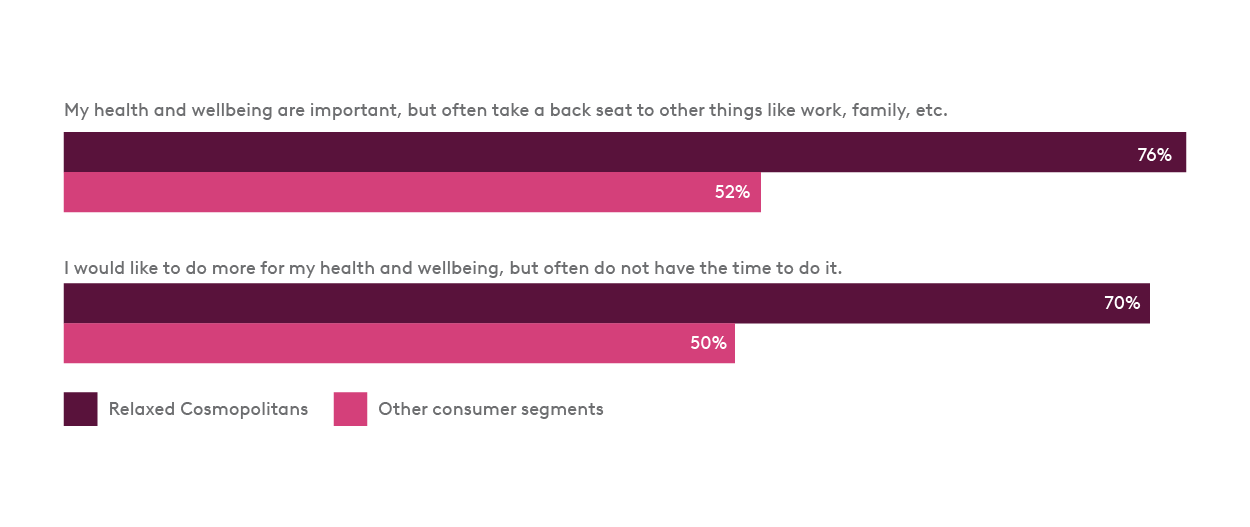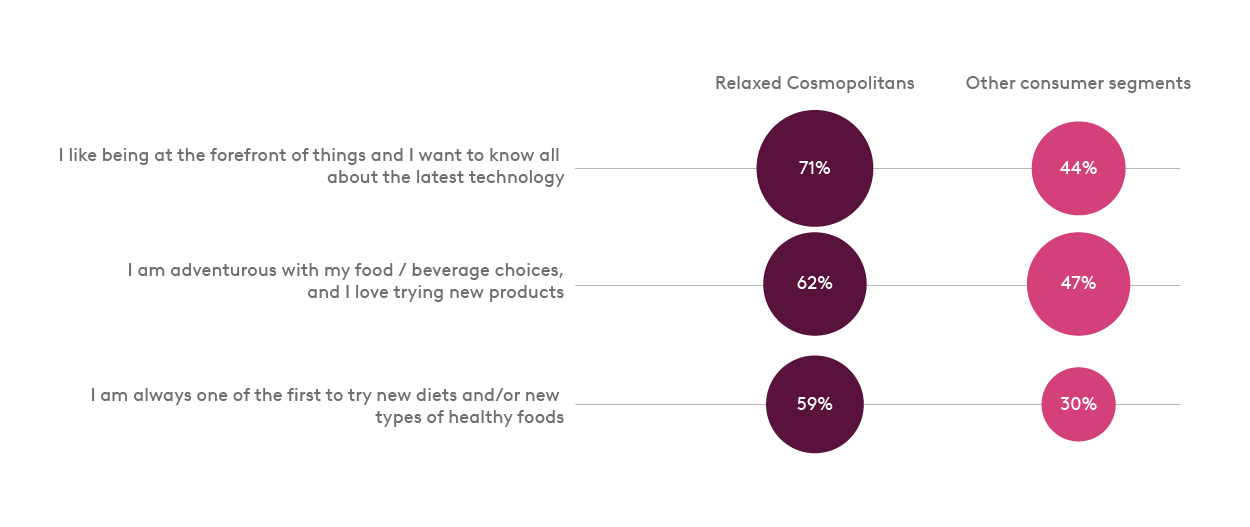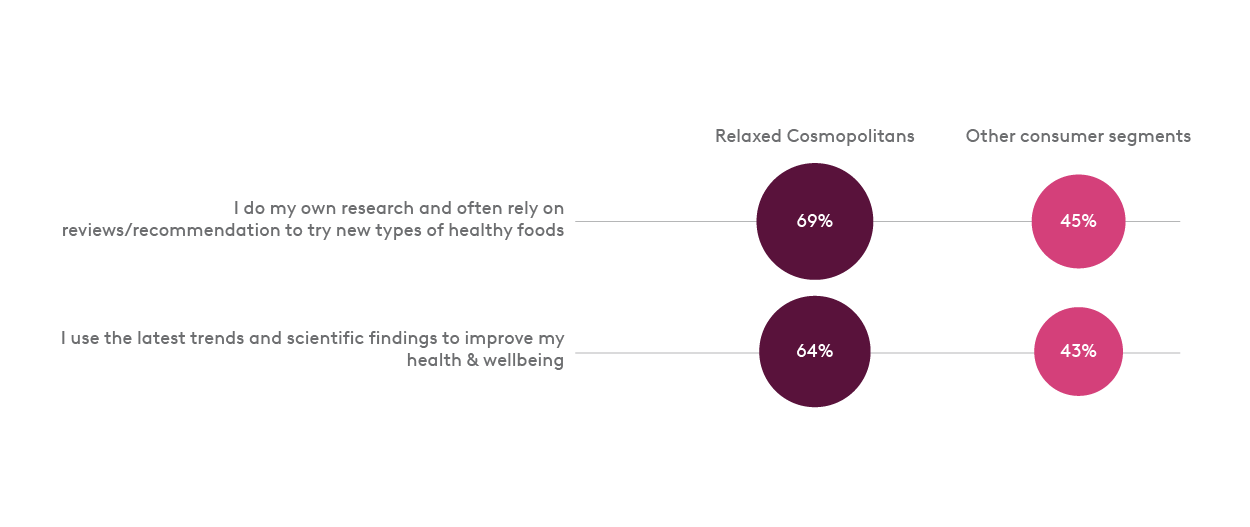SUGGESTED SEARCHES
Consumer Deep Dive Series: The Relaxed Cosmopolitans
Consumer Deep Dive Series: The Relaxed Cosmopolitans
The Global State of Health & Wellbeing – Volume 2
This is Part 4 of 5 of our Consumer Deep Dive Series, an article series on the consumer segments identified in The Global State of Health & Wellbeing Report - Volume 2. Read Part 1 ,Part 2 and Part 3.
Every consumer group has its own nuanced needs and habits, and it is crucial for brands to tailor solutions and messaging to engage with them. For the fourth piece in our Consumer Deep Dive series, we examine Relaxed Cosmopolitans – who make up 16% of the global health-conscious consumers identified in our Consumer Segmentation Report.
Relaxed Cosmopolitans approach life with a laid-back attitude. As a relatively young consumer group unburdened by health conditions and satisfied with their physical and mental wellbeing, they are the least involved in managing their health among the five segments identified.
Relaxed Cosmopolitans are less focused on the health benefits of the food and drink they consume than other segments. Seven in 10 see eating and drinking as a form of pleasure, rather than something that can prevent sickness or the development of health conditions later in life.
Why then should nutrition brands target this minimally engaged and involved segment? Although health is not a priority for Relaxed Cosmopolitans due to factors like work and family, they do understand the holistic benefits of nutrition, with nearly two-thirds believing that what they eat makes the biggest difference to their health. They would like to do more, but their busy schedules are their biggest hurdle to prioritising health and wellbeing.

Figure 1: Willingness to do and learn more about health & nutrition
Additionally, Relaxed Cosmopolitans are adventurous with what they eat, and are excited to try new products, especially those they can easily incorporate into their full work and social lives. They have a competitive streak and are driven by a desire to be early adopters of the latest products and innovations.

Figure 2: Willingness to explore something new in nutrition
These young city dwellers also have high purchasing power and present strong potential for brands both now and as they develop age-related health concerns in later years. The question then is, how can brands help this group prioritise nutrition as a tool to improve their health and wellbeing now and in the future?
People and planet first
Relaxed Cosmopolitans are acutely aware of the environmental impact of their consumption habits. 71% want to make a positive difference to the environment, while another 75% think that food and drink must be sustainable. More than seven in 10 believe the responsibility falls on the manufacturer to ensure food and beverages are sustainably sourced.
Did You Know?
While 64% of Relaxed Cosmopolitans think dairy is good for health, around half say they prioritise vegan products. This could be because sustainability is a key priority for the segment, yet they understand the benefits of dairy protein on overall health. There may be a sizeable number who believe dairy can be sustainably sourced.
Developing transparent supply chains and ensuring every ingredient is ethically sourced and produced should be a priority for brands looking to develop loyalty among this consumer segment.
While sustainably sourced ingredients and packaging cost more, Relaxed Cosmopolitans prioritise the environmental and social impact of a product over its price. With higher disposable incomes thanks to urban salaries and fewer dependents, Relaxed Cosmopolitans are willing to pay a premium for brands that appeal to their values.
Appeal to the tastebuds and busy schedules
Food is more about enjoyment than nutrition for Relaxed Cosmopolitans.
A delicious-tasting, convenient product that fits seamlessly into their busy lives, like Nutiani’s Crispy Protein Granola Bar, would be appreciated by these time-poor urbanites.
Formats with enjoyable tastes and textures such as energy drinks, ready meals, baked goods, frozen desserts, protein shakes, protein water, diet shakes, and energy gels are also popular choices among Relaxed Cosmopolitans. These are also formats that are easy to reach for on hectic days.
Stand out through fortification
While taste is important for Relaxed Cosmopolitans, it is not enough to win over the segment. Brands looking to truly stand out and appeal to this adventurous group should look to fortification.
65% of Relaxed Cosmopolitans do not believe that a natural diet alone can provide all the nutrition they need to stay healthy.
Hence, they are more likely than other segments to turn to fortified and multifunctional products that can deliver all nutritional needs in a single sitting, such as ready-made meals and baked goods. A product that is convenient, tastes good, and addresses multiple areas of concern – such as weight, stress, and gut discomfort – would be seen as time-efficient and most attractive for this group.
Overcome information overload
Two-thirds (69%) of Relaxed Cosmopolitans reported that they turn to social media for information, regularly looking at content on platforms such as YouTube (32%) or Instagram (26%) for information to educate themselves on health and nutrition. Being younger, digitally savvy consumers, they are also the most influenced by friends, peers, family members, celebrities, and sportspeople.
The hunger for being at the forefront of what’s new is countered by the majority of Relaxed Cosmopolitans (75%) saying they feel overwhelmed by too much information, which prevents them from delving into health and nutrition research. This may be due to rising awareness of “fake news” - we know that more than two thirds of global consumers are worried about the coordinated spread of false information on social media.

Figure 3: Key actions taken to improve diet and health
When choosing their food and beverages, two-thirds of Relaxed Cosmopolitans say it is important that products back up any health benefit claims with clinical trials and other scientific evidence. To overcome information-overload and fear of fake news, brands can create engaging video and image-heavy content that cite the latest scientific research, for example around the stress-relieving properties of phospholipids.
The bottom line for appealing to Relaxed Cosmopolitans
In conclusion, Relaxed Cosmopolitans lead busy lives and are driven by their values. They often do not have time to sift through information and are wary of its credibility, but are curious to try new things and are willing to pay more for sustainable and high-quality products.
Brands can deliver trusted insights and research via social media to help Relaxed Cosmopolitans understand the long-term and immediate benefits of nutrition, while also developing convenient and fortified nutrition products that can easily be incorporated into their dynamic, urban lives.
As Relaxed Cosmopolitans begin to see the connection between their present diets and their future state of health, they will grow as a powerful consumer group that pushes brands to develop exciting values and science-driven products.
As a wellbeing nutrition brand, we help customers navigate the diverse needs of their consumers and work closely with them to tailor solutions that resonate with all groups. If you’re interested in launching a new nutrition product, please reach out to us to learn more about how we can help.
STAY AHEAD



